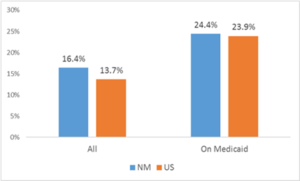Behavioral Health Tobacco & Nicotine Treatment Resource Guide
Background on Tobacco and Nicotine Treatment in Behavioral Health in New Mexico

Overall, 22 percent of adults in New Mexico (NM) reported any tobacco use (including cigarettes, smokeless tobacco or e-cigarettes) according to the most recent data available (2016-2017). Of adults in New Mexico, 16 percent report smoking traditional combustible cigarettes and according to New Mexico’s Indicator-Based Information System (NM-IBIS), smoking rates have steadily declined since 2011 – when smoking rates were just over 20 percent.
Cigarette smoking is twice as prevalent among adults who are living below the poverty level, 20.7 percent, compared to those living above the poverty level, 10.7 percent. Medicaid recipients in NM also have doubled the rate of smoking compared to those not receiving Medicaid, 12 percent. Cigarette smokers reported poorer mental health compared to non-smokers – 30 percent versus 14 percent. Adult New Mexicans who had suicidal thoughts within the past year were twice as likely to be cigarette smokers (29 percent versus 15 percent). Also, both heavy drinking and binge drinking increase a New Mexican adults’ chances of smoking by over half: 36 percent of heavy drinkers were smokers and 15 percent were non-smokers and 31 percent of binge drinkers were smokers and 14 percent were non-smokers.
There are significant disparities in tobacco use among adults with behavioral health conditions. The following data demonstrate disparities in tobacco use for adults with behavior health conditions based on the 2016-2018 New Mexico Behavioral Risk Factor Surveillance System (BRFSS). National data used for comparison come from a 2019 Morbidity and Mortality Weekly Report (see references).
Constellation Consulting, in collaboration with the New Mexico Department of Health Tobacco Use Prevention And Control Program, has created this Behavioral Health Tobacco & Nicotine Treatment Resource Guide. This guide is available for free and as a downloadable PDF. To add resources to the guide, please email suzanne@constellationnm.com.
Behavioral Health Advisory Council
Constellation Consulting convenes the Behavioral Health Advisory Council to help to identify and address gaps in nicotine treatment in behavioral health facilities and related community based organizations in New Mexico. In FY24, the Behavioral Health Advisory Council is developing action plans to address these gaps.
For more information about the Behavioral Health Advisory Council or to join, please contact krista@ConstellationNM.com.
Behavioral Health Online Training Modules
In FY22, Constellation Consulting worked in collaboration with the New Mexico Department of Health Nicotine Use Prevention And Control Program and convened the Behavioral Health Advisory Council to inform tobacco and nicotine treatment processes in our state. Through the work of the Behavioral Health Advisory Council, two new online training modules are now available. Free Social Worker CEUs are available for both of these modules through June 30, 2023.
Behavioral Health Webinar Series on Tobacco & Nicotine Treatment
These sessions took place May - June, 2020
Constellation Consulting, in cooperation with the Tobacco Use Prevention and Control Program (TUPAC), with funding from the New Mexico Department of Health, to reduce adult and youth tobacco use through environmental strategies, hosted the Behavioral Health Webinar Series on Tobacco & Nicotine Treatment in May - June, 2020.
Featuring content experts as presenters, this series is designed to provide attendees with information, skills, and materials for use in their day-to-day work in behavioral health treatment environments.
For more information, contact suzanne@ConstellationNM.com.
 This work is funded by the New Mexico Department of Health Nicotine Use Prevention and Control Program.
This work is funded by the New Mexico Department of Health Nicotine Use Prevention and Control Program.